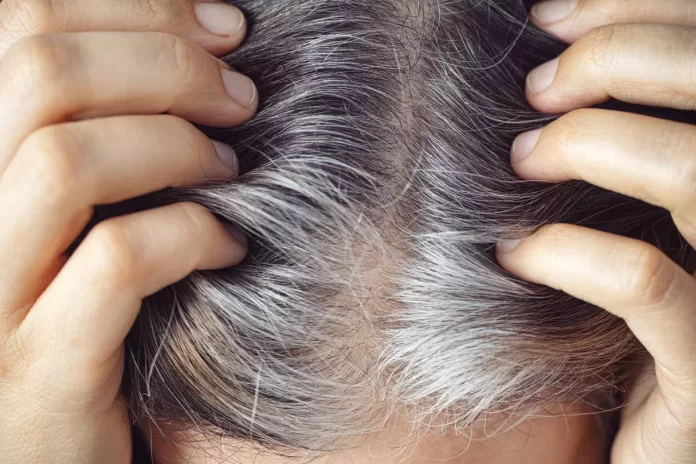Stress is a day-to-day part of our lives. Whether due to work pressures, personal challenges, or unexpected events, we all experience stress from time to time. But have you ever wondered if stress could be turning your hair gray prematurely? It turns out that there might be more truth to that old saying than you think.
The Science Behind Hair Color
Before we dive into the stress and gray hair connection, let’s understand how our hair gets its color in the first place. Melanin is the pigment responsible for hair color. Two types of melanin, eumelanin (dark) and pheomelanin (light) combine in different proportions to create the vast spectrum of hair colors we see.
The Graying Process
Hair graying is a natural part of aging. As we age, our bodies produce less melanin, leading to the gradual loss of color in our hair. Genetics plays a significant role in determining when this process starts and how quickly it progresses. However, some factors can accelerate the graying process, and one of these factors is stress.
The Stress-Gray Hair Connection
The idea that stress can cause gray hair isn’t entirely unfounded. Stress triggers the release of hormones like cortisol, which can affect the melanocytes in our hair follicles. These cells are responsible for making melanin. When stress damages or disrupts them, it can lead to the premature loss of color in our hair by disrupting melanin production.
Research Findings
Several studies have explored the relationship between stress and premature gray hair. One notable study in Nature found that stress can deplete melanocyte stem cells, hastening the graying process. Another study conducted at Harvard University revealed that chronic stress could lead to premature gray hair.
Managing Stress for Healthier Hair
While there’s no surefire way to prevent gray hair, managing stress can help slow down the process. Here are some stress-reduction strategies to consider:
- Meditation and Mindfulness: These practices can help calm your mind and reduce stress.
- Regular Exercise: Physical activity is an excellent stress reliever. It releases endorphins, which are natural mood lifters.
- Healthy Diet: A balanced diet rich in vitamins and minerals can support overall health, including your hair.
The Bottom Line
The link between stress and premature gray hair fascinates researchers, and scientific studies support this notion’s validity. While genetics still play a significant role, managing stress can potentially slow down the graying process and contribute to healthier, more colorful hair.
Frequently Asked Questions (FAQs)
Can stress cause gray hair?
Some studies have linked stress to premature gray hair. While it’s not the sole cause, it can contribute to graying.
How does stress affect hair color?
Stress can impact the melanocyte cells in hair follicles, disrupting melanin production and potentially leading to gray hair.
Can stress-induced premature gray hair be reversed?
Once hair turns gray due to stress, it’s usually permanent. Managing stress can help slow down further graying.
Are genetics or stress more influential in premature graying?
Genetics plays a significant role, but stress can accelerate the process in those genetically predisposed to graying.
At what age can stress-related premature graying occur?
Stress-related graying can happen at any age, even in your twenties or thirties.
What are some stress-reduction techniques to prevent gray hair?
Exercise and a healthy diet can help manage stress and slow down graying.
How long does it take for hair to turn gray due to stress?
The timeline varies from person to person. It may take months or years for noticeable graying to occur.
Are there any medical treatments for stress-related gray hair?
There are no specific medical treatments to reverse gray hair caused by stress at the time of this writing.
Can dietary changes help prevent stress-related gray hair?
Eating a well-balanced diet full of vitamins and minerals can help keep your hair healthy, but it might not stop it from turning gray.
Is there a way to predict if my hair will turn gray prematurely due to stress?
It’s not easy to predict if stress will make your hair turn gray because it depends on your genes and how stressed you are.










